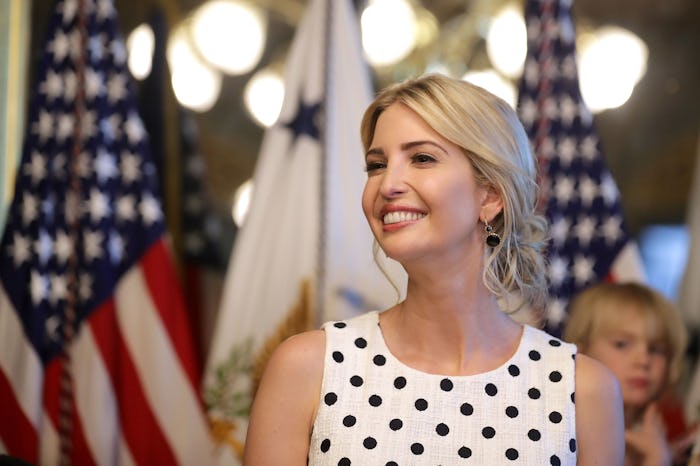News

Ivanka's Parental Leave Policy Is Already Seeing Pushback
The first issue that President Donald Trump's daughter and adviser Ivanka Trump spearheaded on his campaign trail was paid parental leave — and it's a cause she advocated for repeatedly during her time at the White House, eventually helping outline the parental leave policy that was packed into the president's budget proposal. However, it now sounds like Ivanka's paid parental leave proposal could change, just two weeks after it was laid out, due to funding questions raised by states and businesses.
According to the Associated Press, Ivanka met with a group of bipartisan scholars earlier this week in order to discuss a different approach to the paid leave policy. "She said that was just a placeholder or a stake in the ground and they’re open to other ideas," Isabel Sawhill, a senior fellow at the Brookings Institution, told the Associated Press. The institution was one of the organizations that visited the White House in order to pitch an alternative approach.
Ivanka's original plan would see fathers and mothers receive eight weeks of paid leave, and they could receive up to $600 a week while on that parental leave. The benefit would apply to all new parents, regardless of whether they adopted a child or had a natural birth — which was an expansion from the president's original plan (which would only see mothers able to take parental leave).
The plan has received criticism from states and businesses, however, because it would not come with federal funding to support it. As it currently stands, the plan would ask states to fund paid parental leave through their unemployment insurance plans — a funding method that hasn't been well-received by all local politicians.
"My guess is that not every state would end up doing it, in part because state unemployment insurance systems in many, many states are woefully inadequate already just to deal with [unemployment insurance]," Sarah Jane Glynn, a paid leave researcher, told ThinkProgress in May. "There’s no way we would end up with universal coverage."
It's also drawn criticism from politicians and researchers who say it doesn't go far enough and doesn't provide parents with sufficient funding or benefits during their leave.
If the Trump administration does decide to move forward with changes to their proposed policies, hopefully it will be towards providing a more comprehensive policy, rather than retreating due to funding concerns. Research has repeatedly proven that paid parental leave is not only good for parents and their children, but for countries' businesses and societies, as well. It bears repeating that the United States is the only developed nation without a comprehensive, federal paid parental leave policy.
Whether the federal government works out a way to provide funding on its own or works with states to iron out problems, Americans across the country need to have a stable, reliable way to take time off and take care of their children. Considering the benefits that come with paid parental leave, it's high time we consider it a mandatory benefit that needs to be funded, rather than something optional that states can decide on individually.